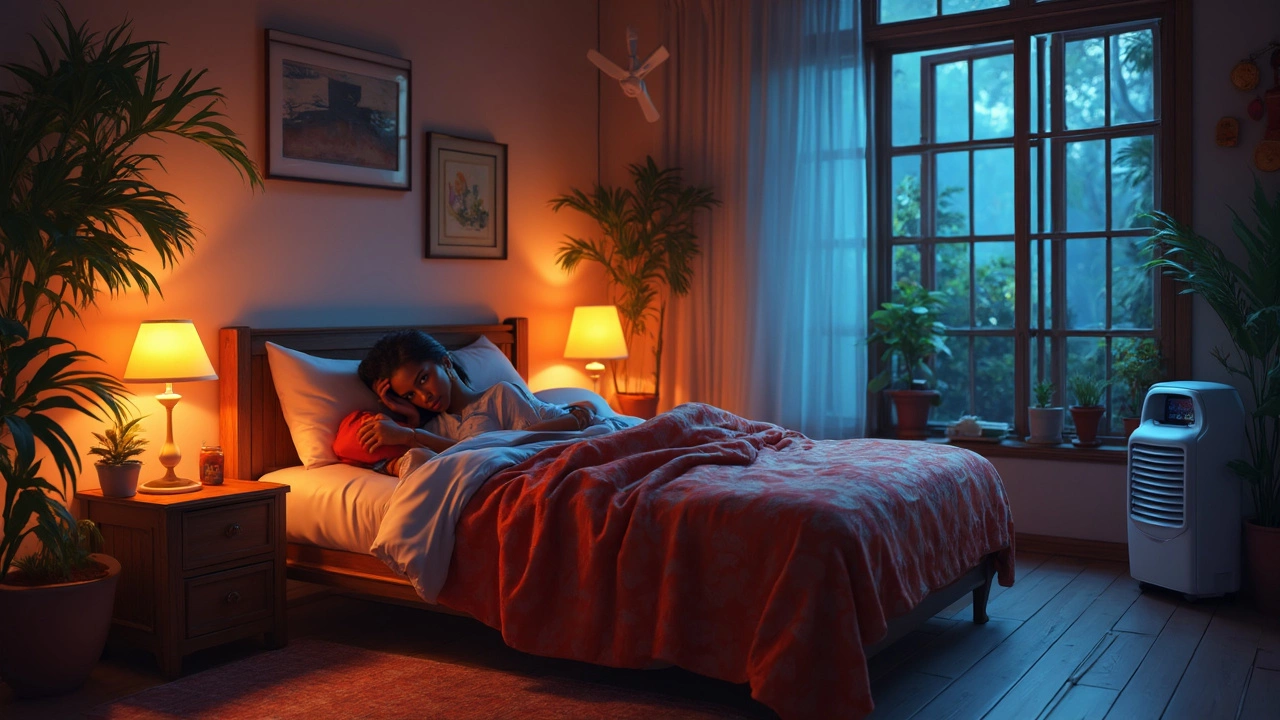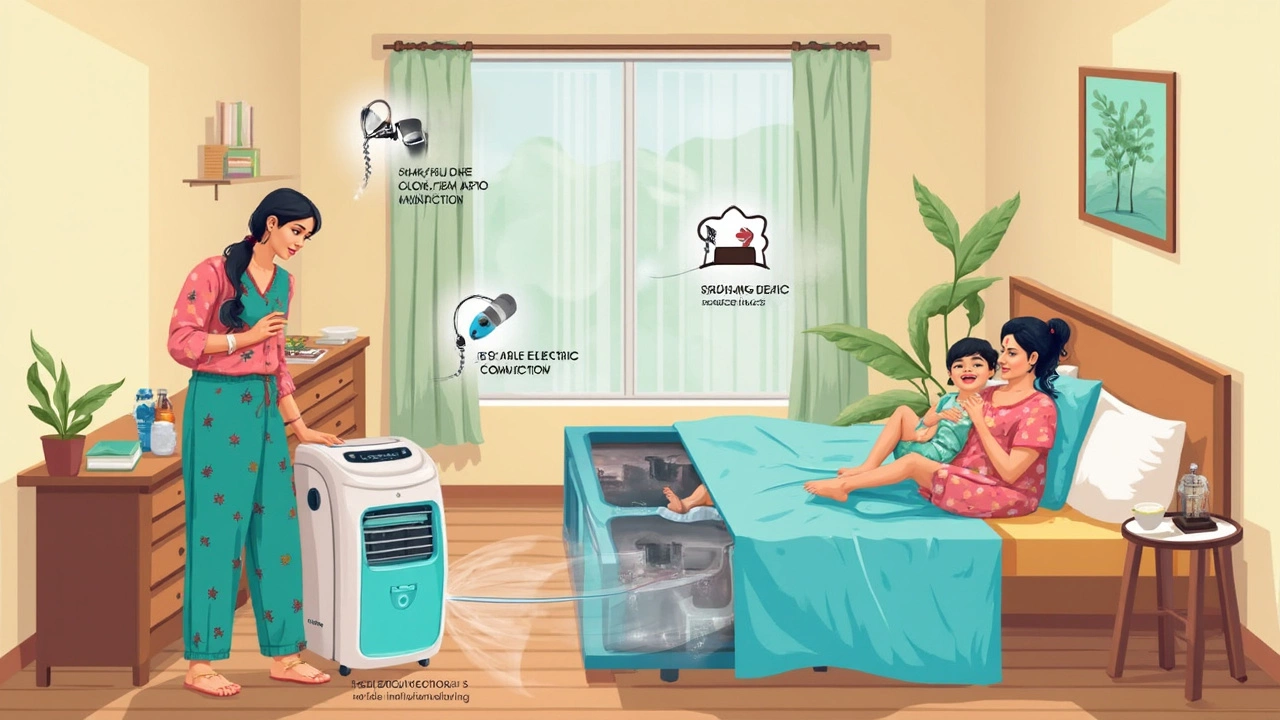
Ever find yourself sweating in the middle of a summer night, staring at your portable air conditioner, and wondering if you should just leave it on while you sleep? You're not alone. It's tempting to let it run for hours, but is it actually safe or smart?
First off, portable air conditioners are made for people to use indoors, day or night. Lots of folks use them overnight, especially if central AC isn’t an option. As long as the unit is well-maintained, in good working order, and vented properly, most brands are designed not to pose a danger while you sleep. Plus, sleeping in a cool room can help you fall asleep faster—ever hear that your body’s core temp has to drop a bit to trigger good sleep?
Still, a few things do matter. You have to check your power cords, filters, and exhaust hoses every now and then. A clogged filter, messy exhaust, or old extension cord is basically asking for trouble. A quick check can save you from waking up at 3 AM sweating not from heat, but from panic.
- What Happens If You Sleep With a Portable AC On?
- Health and Safety Considerations
- Smart Usage Tips for Cool, Safe Nights
- Signs You Need to Change Your Approach
What Happens If You Sleep With a Portable AC On?
Firing up your portable air conditioner at bedtime means you’ll probably fall asleep faster and stay cool, even on muggy nights. Most modern units are built to run for hours, so running one overnight isn’t something you need to panic over. In fact, keeping your sleep environment between 60°F and 67°F is actually recommended for better rest, according to the Sleep Foundation. That’s right—cooler temperatures help your body chill out and do its recovery work.
But what about side effects? Well, a couple of things happen while you snooze with the AC humming.
- Constant air flow can dry out your skin, eyes, or nasal passages, especially if you sleep with the unit pointed straight at you. Some folks wake up feeling a scratchy throat or stuffy nose.
- If the portable air conditioner isn’t maintained—like dirty filters or blocked vents—it can actually blow dusty air around or increase humidity if the water tank isn’t emptied out.
- Noise is another thing. Some units are whisper-quiet, but others can get a little loud. If you’re a light sleeper, a noisy model can mess up your sleep cycle.
For reference, here’s what people experience most often when they sleep with a portable AC on overnight:
| Potential Effect | How Common? |
|---|---|
| Better sleep comfort | Very common |
| Dry skin or throat | Moderately common |
| Noise disturbance | Depends on the unit |
| Increased energy use | Definite, if used nightly |
Keep in mind, letting a portable air conditioner run all night will bump up your electricity bill, especially if your unit isn’t energy efficient. And if you have pets in the room, strong airflow or super-chilly temps aren’t always great for them either. The upside? You get a solid, sweat-free night’s rest in exchange for managing a few quirks.
Health and Safety Considerations
If you’re planning to sleep with a portable air conditioner on, there are some health and safety basics to think about first. Most problems come down to air quality, noise, possible leaks, or electricity risks. Let’s break them down.
- Electric Safety: Using your AC overnight means it’ll run for hours. Always plug it straight into the wall. Skip those cheap power strips and extension cords—overheating and fire risks aren’t worth saving an outlet.
- Proper Venting: Portable ACs suck hot air out of your room—if the exhaust hose isn’t vented outside through a window, you’re just making the room stuffy or, worse, blowing warm air back in. Bad venting can also lead to too much humidity, which some people feel as a “clammy” or sticky sleep.
- Air Quality: These units pull in dust, hair, and who-knows-what else, then blow it back out. If you skip filter cleaning, you’ll end up with poor air. Breathing this all night—especially if you have allergies or asthma—is a bad move. Changing or cleaning the filter every 2-4 weeks is smart.
- Noise Level: Some portable air conditioner brands are louder than a running refrigerator. Too much noise messes with your deep sleep, even if you don’t fully wake up. If your sleep quality drops, check the decibel rating on your model or think about white noise as a workaround.
- Leaks and Drips: All ACs pull moisture from air. If the drain pan or hose isn’t cleared, you might wake up to a puddle or even water damage. Always double-check the water tank if your unit doesn’t self-evaporate.
How about some numbers? A typical portable air conditioner uses between 800 and 1,500 watts an hour. That’s a pretty big chunk of your home’s electricity use if you run it all night:
| AC Power (Watts) | Hours Used Overnight | Total kWh Used |
|---|---|---|
| 1,000 | 8 | 8 |
| 1,350 | 8 | 10.8 |
Not only does that hit your electric bill, but older wiring or overloaded circuits can become a fire hazard. If your room gets warmer than it should, or your unit’s power cord feels hot, shut things down and check for problems.

Smart Usage Tips for Cool, Safe Nights
Want to keep your room cool all night and stay safe? Here are simple moves to make your portable air conditioner work better while you sleep, without risk.
- Don't block the exhaust hose: Always point it out an open window and make sure nothing is blocking it. If the hot air can't get out, your AC will overheat and your room will just stay muggy.
- Clean your filters once a month: Dust and gunk make your unit work harder and can mess with the air quality. Pop out the filters and run them under warm water; most brands make this super easy.
- Keep extension cords to a minimum: Plug directly into the wall if you can. If you must use an extension cord, it should be heavy-duty and not shared with other big gadgets.
- Set your thermostat smart: Experts say setting your AC around 75°F (24°C) helps you sleep comfortably without shocking your system—or your energy bill.
- Close doors and windows: This keeps cool air in and hot air out, letting your AC work a lot less to keep things chill.
- Use "Sleep Mode" if you have it: Many models have a special night mode that slowly raises the temperature a couple degrees as you sleep. This means fewer cold wakeups at 3am and less power use.
- Check water tanks if your unit has one: Some portable ACs pull water from the air and may need you to empty a tray. Letting the tank overflow can cause leaks or turn off the unit by accident.
- Position it right: Place the portable AC away from curtains, walls, and furniture so air can flow freely around the room. This chills your space faster and more evenly.
If you're wondering about numbers, a typical portable air conditioner uses 900-1,250 watts per hour, which is less than most hair dryers but more than a fan. So leaving it on all night won't spike your electric bill, but you should still shut it off in the morning or when you leave the house.
These habits don't take much effort but can mean the difference between a miserable, sweaty night and a solid sleep. Keep these tips in your routine and you'll stay cool and worry-free.
Signs You Need to Change Your Approach
If your portable air conditioner leaves you more uncomfortable than cool, something's off. The machine is supposed to help you sleep, not make things worse. There are some dead giveaways that you need to rethink how—and even if—you use it at night.
- Constant stuffiness or dryness. If you wake up with a scratchy throat or super dry skin, your air might be too dry. Most portable air conditioner models can zap moisture from the air fast, especially in small rooms.
- Loud noises keep you up. Some units get louder over time, especially as filters get dusty or if something’s loose inside. If your AC rattles, pops, or hums so loud you can't sleep, that's a clear sign to clean or check for issues.
- Weird smells or musty air. Portable units can grow mold in their filters or hoses if you don’t clean them regularly. If your room suddenly smells funky, don't put off a deep clean. Mold spores can cause headaches and allergy symptoms—nothing you want at night.
- Power bills shoot up. If your energy bill surprises you, your AC may be running longer than needed, or it’s working too hard due to blockages. That’s bad for your wallet and your sleep quality.
- Hot spots or uneven cooling. If half of your room stays stuffy while one corner turns polar, your AC might be too small or too big, or maybe it isn’t vented right. Sleeping in an unevenly cooled space won’t help you feel rested.
Here's a quick look at a few stats and red flags:
| Sign | What It Means |
|---|---|
| Increased sneezing or coughing at night | Air filter needs cleaning or replacing |
| Waking up sweaty or freezing | Temperature settings are wrong or unit size is off |
| Unit shuts off randomly | Possible overheating or electrical problem |
If any of these happen, don't just keep pushing the 'on' button and hoping. Change your filter, adjust your settings, or consider giving your portable air conditioner a rest on mild nights. With regular maintenance and some smart tweaks, you'll get the benefit without the headaches.